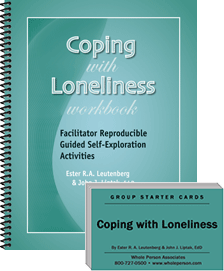 Exploring the Forms and Effects of Loneliness
Exploring the Forms and Effects of Loneliness
In November of 1960 Elvis Presley sang Roy Turk’s lyrics to teenagers through their transistor radios:
Are you lonesome tonight
Do you miss me tonight?
Are you sorry we drifted apart?
-Roy Turk – 1926
The theme was so popular the song was released by popular singers and bands more than seven times…each time becoming a hit.
What is Loneliness?
Human beings are social by nature and need human interaction and connectedness. When people experience adequate levels of human interaction and connectedness, they feel a sense of satisfaction. On the other hand, when people are experiencing inadequate levels of interaction and connectedness, they feel lonely – something’s missing.
Therefore, loneliness is a noticeable difference between people’s desired level of social interaction and the actual level of social interaction. Loneliness is a sense of connection to others who help to satisfy one’s needs. It is the feeling of no one to talk, relate, or share with – even though people are all around. Being with loved ones does not guarantee absence of loneliness.
Loneliness is not synonymous with being alone. People who are alone are by themselves and not with other people. Some people view aloneness as a positive and others see it as negative.
In our society filled with people who communicate primarily with a wide variety of technology, face-to-face social interaction has become less common, feelings of connectedness are rare, and people are lonelier than ever before. Technology can provide a false sense of being connected twenty-four hours a day, seven days a week. This feeling of virtual connection, however, may be deceiving, and people benefit with social face-to-face connections with other people.
People experience loneliness for many different reasons. Most of these reasons are related to feeling a lack of social support and fall into five basic categories:
- Life Changes – Loneliness often occurs in the midst of major life changes such as loss of loved ones, moving to a new city, or not being able to work because of an illness or disability. These types of major life changes often discourage people to meet others.
- Getting Older – As people age, they experience the death of friends and family and often feel as if they have fewer people who share their life experiences.
- Inadequate Social Skills – When people are unable to communicate with others because they have weak social skills, they are at risk for loneliness. A lack of adequate social skills can make it difficult for people to develop and maintain relationships with others.
- Personality Characteristics – People often are shy or lack the power of self-esteem to make friends easily, and therefore receive fewer responses to their overtures and less support from other people.
- Situational – People often experience loneliness when they are surrounded by people who have different ideas, values and interests. Therefore, when people do not have friends, family members, and acquaintances with whom to share experiences, they perceive themselves to be different, and feel lonely.
Almost everyone will experience loneliness from time to time. Different forms of loneliness exist.
Situational Loneliness –people feel lonely due to a situation or experience. This is a temporary situation. An example would be moving to a new city where a person does not have any friends and has not made any acquaintances. Even though this situation brings on feelings of loneliness, these feelings will naturally disappear once the person has made new friends. This state of loneliness is usually a transient form of loneliness that changes as the situation or circumstances change.
Chronic Loneliness – This is a form of loneliness that persists over time, regardless of the situation or circumstances. This chronic form of loneliness usually results from having a weak or non-existent support system, a lack of social skills, shyness, and/or low self-confidence. An example would be a person who lacks the self-confidence to initiate conversations when meeting new people, or a person who fears being alone. This type of loneliness often requires the person to take action and build a new set of social skills. A specific type of this loneliness involves people with mental health issues. Even if they have a great support system and are surrounded by those who care, their issues cause them to feel alienated and lonely. They need to see a medical professional if it continues.
As loneliness becomes a bigger problem for people on all levels of society, it is important to distinguish the specific symptoms of loneliness. Because loneliness is an extreme emotional state in which people experience powerful feelings of isolation from others, it is accompanied by a variety of thoughts and feelings. People who are lonely will exhibit many of the following symptoms:
| • Crying a lot of the time
• Feeling “hollow” inside • Feeling alienated from other people • Feeling as if you are alone, even though you are surrounded with others • Feeling as if you are not accepted • Feeling as if you are not as worthwhile • Feeling as if you are not loved • Feeling as if you cannot make friends or build stronger relationships with acquaintances
|
• Feeling as if you do not have the same
interests and values as those around you • Feeling as if you have nobody with whom to share personal concerns and experiences • Feeling cutoff or disconnected • Feeling damaged and unloved • Feeling empty • Feeling lost with no direction • Feeling physical pain akin to a “broken heart” • Feeling sad
|
Effects of Loneliness
Negative feelings of loneliness can lead to a variety of other health-related concerns and stress-related conditions including heart disease, high blood pressure and stroke. In addition, loneliness is often related to addiction, various forms of anti-social behavior, disrupted sleep  patterns and various mental-health conditions. People experiencing long-term (chronic) form of loneliness are more susceptible to experiencing these wider effects of loneliness. If your participants are experiencing any of these effects, suggest they see a medical professional.
patterns and various mental-health conditions. People experiencing long-term (chronic) form of loneliness are more susceptible to experiencing these wider effects of loneliness. If your participants are experiencing any of these effects, suggest they see a medical professional.
This article was excerpted from Coping with Loneliness
By Ester R.A. Leutenberg and John J. Liptak, EdD
